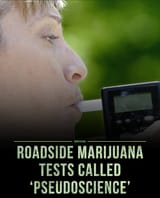Search Results
7/24/2025, 3:43:09 AM
Current roadside tests for marijuana impairment lack scientific credibility and are often unreliable, says Rutgers law professor William McNichol.
In a recent paper, he argues that these tests-many modeled after alcohol detection-don't accurately reflect cannabis impairment.
McNichol criticizes tools like drug recognition experts (DREs), calling them "police science" with no true medical backing.
Studies show blood THC levels don't consistently correlate with driving performance, and chronic users may test high without being impaired. Experts call for psychomotor tests and new biochemical markers instead. Meanwhile, federal and industry policies continue relying on outdated standards, which some say worsen driver shortages. McNichol urges the scientific community-not police-to lead development of valid impairment measures, as cannabis becomes more mainstream and legal across the U.S.
>https://www.marijuanamoment.net/current-roadside-tests-for-marijuana-impairment-are-pseudoscientific-law-professor-says/
In a recent paper, he argues that these tests-many modeled after alcohol detection-don't accurately reflect cannabis impairment.
McNichol criticizes tools like drug recognition experts (DREs), calling them "police science" with no true medical backing.
Studies show blood THC levels don't consistently correlate with driving performance, and chronic users may test high without being impaired. Experts call for psychomotor tests and new biochemical markers instead. Meanwhile, federal and industry policies continue relying on outdated standards, which some say worsen driver shortages. McNichol urges the scientific community-not police-to lead development of valid impairment measures, as cannabis becomes more mainstream and legal across the U.S.
>https://www.marijuanamoment.net/current-roadside-tests-for-marijuana-impairment-are-pseudoscientific-law-professor-says/
Page 1
